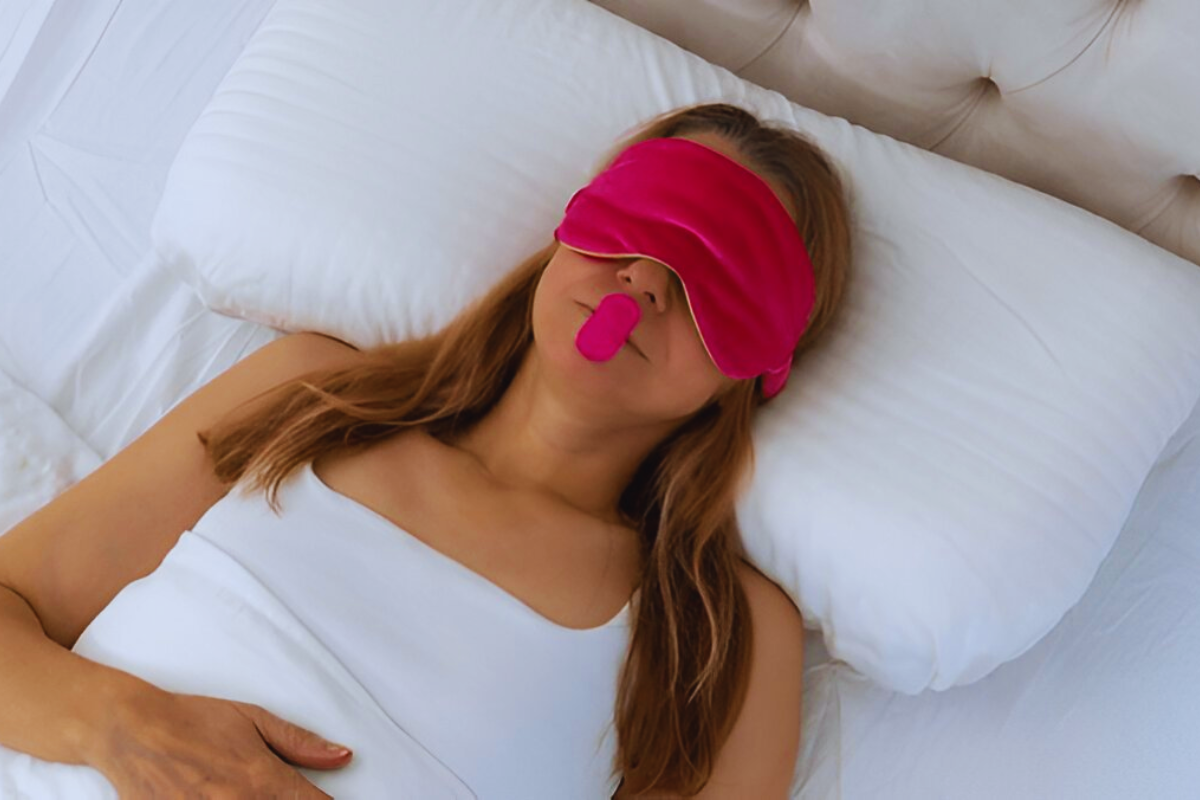Mouth Taping for Better Sleep: A new way of sleeping known as mouth taping has recently taken the world by storm, especially on social networks, namely TikTok. Advocates believe that it helps to sleep voicelessly by using the nose airway, which helps to reduce snoring and thus improving the overall quality of sleep. However, medical professionals advise against this method out of the potential health risks it poses and the absence of scientific data that will support the claimed health benefits of the procedure.
Understanding Mouth Taping
Mouth taping implies putting a strip of tape over the lips at night to ensure that nasal breathing is the only way to go throughout the time of sleep. The idea of its supporters is that nose breathing filters and humidifies the air, which will result in better oxygen intake and can be a way to have better and quality sleep. On the other side, sleep time breathing through the mouth has the potential of causing some issues such as dry mouth, bad breath, and the possibility of dental care or dental issues to be subjected to.
Potential Benefits: Limited Evidence
A small number of research reports have tackled the theme of mouth taping.
- Snoring Reduction: An exploratory examination came up with mouth taping potentially cutting down the snoring in people who have mild obstructive sleep apnea (OSA). Participants reported lower snoring levels and did not stop breathing as often. However, such implications are not conclusive, and further studies are needed to provide the same results.
Health Risks and Expert Warnings
Despite the eyewitness accounts claiming the effectiveness, health practitioners reveal some of the possible risks of mouth taping:
- Impaired Breathing: Breathing obstruction occurs when the mouth is shut by an adhesive tape, especially among people with nasal congestion, hay fever, or structural nose problems. These occurrences may result in sleep apnea, which is a condition arising from a reduction in oxygen, and to disrupted breathing during sleep.
- Worsening Sleep Apnea: OSA accounts for a major risk factor in individuals who have OSA, and this only gets worse when they fail to identify the condition or when they acquire the debilitating disease and do not receive effective treatment. If the taping tries to stop the patients from their required mouth breathing in case of apnea, it could result in the development of very dangerous heart problems. .
- Skin Irritation: The process of attaching the tape to the tender skin surrounding the mouth may lead to unpleasant skin reactions, irritation, or rashes, especially if it is done repeatedly.
Expert Opinions
Dr. Luisa Bazan, a sleep specialist at Henry Ford Health, advises against mouth taping due to insufficient scientific backing and potential dangers. She emphasizes that mouth breathing during sleep often indicates underlying issues such as nasal obstructions or sleep disorders that require proper medical evaluation and treatment.
Similarly, Dr. Kathryn Palmer, a sleep medicine specialist with Banner Health, warns that mouth taping is not a safe method to improve nasal breathing. She notes that it can lead to blocked airflow, sleep apnea, and skin reactions, stressing the importance of addressing the root causes of mouth breathing with a healthcare provider.
Safer Alternatives to Improve Nasal Breathing
Individuals seeking to promote nasal breathing and enhance sleep quality are encouraged to consider the following safer alternatives:
- Consult a Healthcare Provider: A medical professional can assess and address underlying causes of mouth breathing, such as nasal congestion, deviated septum, or sleep apnea, and recommend appropriate treatments.
- Nasal Strips or Dilators: To have a better sleep, the person can utilize some convenient nasal passage augmenting methods like over-the-counter nasal strips and nasal dilators.
- Positional Therapy: Rather than going to sleep on his/her back, the subject should sleep on one side to counteract snoring and encourage minute breathing through the nose.
- Address Allergies: Keeping control of nasal matters through the treatments or methods of the environmental control which would help to decrease the inflammation of the nose and let air inside it will be one symptom of this
- Maintain a Healthy Weight: It is worth noting that one should try to keep their weight at a healthy level and this could possibly be a means to help with sleeping disorders and other diseases that may occur in respiratory function during sleep.
Mouth taping as a means to prevent sleep disorders has become a widely recognized technique as it is said to encourage nasal breathing, however, the advice given by the medical experts on this issue is to exercise caution. The scientific evidence of this technique is still weak, and in terms of mild to severe health issues, it may cause suffocation and bi-anonymity in regards to the sleep disorders.
Patients who suspect the development of an issue with sleep or have had the problem of mouth breathing should consult the doctors who will in their turn make the necessary actions to identify and treat the main problems safe and effectively.

